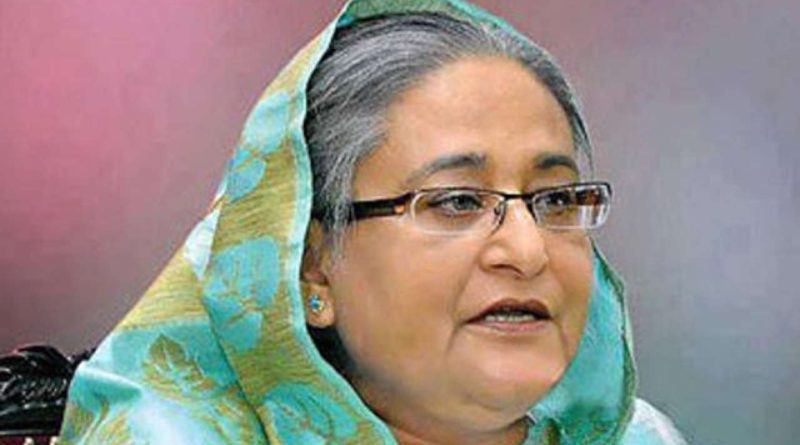Dhaka: Bangladesh’s deposed prime minister Sheikh Hasina Thursday condemned the arrest of Hindu leader Chinmoy Krishna Das on sedition charges and demanded his immediate release, saying that religious freedom and the security of life and property for all communities must be ensured.
Hasina, the Awami League president, also demanded punishment for those involved in the murder of a lawyer in Chattogram, saying that the “unconstitutional” government led by Muhammad Yunus has failed to provide security to common people, according to a statement in Bengali posted on the party’s X account.
In a separate statement, her party said the “unlawful arrest of popular Hindu priest, the denial of bail and refusal of the regime advisors to acknowledge of violence showed minorities right to freedom of speech, assembly and protection have been trampled completely”.
“A top leader of the Sanatan religious community has been unjustly arrested, he must be released immediately,” Hasina said.
She said that a temple had been burnt in Chattogram, recalling that mosques, shrines, churches, monasteries and homes of the Ahmadiyya community were attacked, vandalised, looted and set on fire in the past.
“Religious freedom and security of life and property of people of all communities should be ensured,” said Hasina, who was ousted on August 5 after a mass protest against her government.
Das, a spokesperson for the Bangladesh Sammilita Sanatani Jagran Jote, was arrested from Dhaka’s Hazrat Shahjalal International Airport on Monday. He was denied bail and sent to jail by a Chattogram court in a sedition case on Tuesday. A lawyer was killed in a clash between security personnel and supporters of the Hindu leader.
“Those involved in this murder should be found and punished quickly. Human rights have been grossly violated through this incident. A lawyer went to perform his professional duties, and those who beat him to death were terrorists. Whoever they are must be punished,” Hasina said.
Hasina fled to India on August 5 and three days later, Yunus, a Nobel laureate, took over as the Chief Adviser of the interim government.
She said that if the “unconstitutional” government of Yunus failed to punish these terrorists, it would face punishment for human rights violations.
Hasina also appealed to Bangladeshi people to stand united against this kind of “terrorism”. “It is important to ensure the safety of the lives and property of the common people,” she said.
She said those who grabbed powers have failed in all areas. They failed to control the price rise and also failed to provide security to human life.
The longtime former premier also claimed that several Awami League leaders and workers, students and members of law and order forces were either killed or arrested. “I strongly condemn and protest these activities.”
In its statement, her party reiterated that in over a hundred days of the “unelected interim regime” headed by Yunus, minorities encountered thousands of acts of communal violence, including killing, rape, physical attacks, and extortion while their houses, worship places and businesses were looted, torched and vandalized alongside systematic vilification, hate campaign and expulsion from government jobs.
“But spearheaded by Yunus and echoed by his advisors and like-minded parties alongside Islamist forces, a persistent denial of communal violence, deliberate downplay of the scale of atrocities and systematic branding of minorities as supporters of Awami League only exacerbated the plights of minorities,” the party said.
“We believe the appearance of tens of thousands of minorities in different peaceful rallies demanding an end to the impunity of perpetrators emerged as the biggest rejection from the community to lies peddled by Yunus on ensuring the safety of the community,” it added.
The AL also said the unity among political parties and Islamist forces backed by the Yunus-led regime in whitewashing communal violence with deafening silence and ongoing impunity for attackers would not unify the nation but rather destroy cohesion and upend syncretic culture, opening doors for forces seeking imposition of Islamic rule.
It condemned the weaponisation of the legal system and application of false lawsuits as sedition and murder charges against dozens of minority rights activists who have become vocal over the persecution of minorities.
Referring to the “disturbing attacks” on Hindus in Chattogram from police, the Awami League demanded a fair investigation into every act of violence including the murder of the lawyer in a transparent manner.
Hindu minority groups have been frequently reporting atrocities against their community members in different parts of Bangladesh, even after Yunus took charge.
There are also reports of the rise of extremist groups like Jamaat-e-Islami and similar ideological extremist wings.
Hindus, who constituted about 22% of Bangladesh’s population during the 1971 Liberation War, now make up roughly 8%, primarily due to socio-political marginalization and sporadic violence over decades.
PTI
